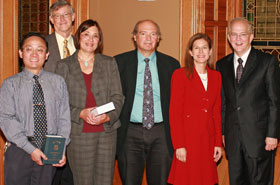  |
| HOME | THIS ISSUE | CALENDAR | GRANTS | BACK ISSUES | < BACK | NEXT > |
Stem Cell Institute approved by Trustees by David Bauman - October 9, 2007 |
||||
| The creation of a Stem Cell Institute at UConn was recently approved by the Board of Trustees, marking an important milestone in the University’s stem cell research efforts. The Institute will be a cross-campus, collaborative effort, uniting under one umbrella two major UConn programs that explore the nature of stem cells and other early-stage cells: the Center for Regenerative Biology in Storrs, and the Health Center’s Department of Genetics and Developmental Biology and Center for Regenerative Medicine and Skeletal Development in Farmington. The Institute will also draw on faculty from other schools and colleges to bring together the interdisciplinary expertise needed to translate the basic science of stem cells – where most work to date has been accomplished – into clinical practice, with the goal of realizing the development of cell replacement therapies. Provost Peter J. Nicholls says the Institute “will provide a critical coordinating, supporting, and promotional structure to enhance the research environment for stem cell investigators from all campuses. “It will facilitate the scientific training and ethics education of the next generation of basic research and clinical scientists,” he adds, “and will disseminate the scientific impact and ethical considerations of stem cell research to the general public.” Eventually, the Institute’s home will be in Farmington, where the University has purchased the former FarmTech building, located across the street from the Health Center campus. The nearly 113,000-square-foot building will be completely renovated by 2010. The new facility will also house related interdisciplinary research programs and provide incubator space for businesses eager to commercialize stem cell science. Creation of the new institute comes as researchers across Connecticut are preparing for the state’s second stem cell grant competition. Last month, the Connecticut Stem Cell Research Advisory Committee, which oversees the grant program, received 87 “letters of intent,” or preliminary proposals, up from 75 last year. The proposals request a total of $45 million in funding for the $10 million available. Of the 87 proposals submitted, 60 were from UConn scientists. “This is an overwhelming response by UConn researchers to the state competition,” said Dr. Marc Lalande, professor and chair of the Department of Genetics and Developmental Biology and associate dean for research planning and coordination at the Health Center.
“It demonstrates that stem cells represent the most promising research in the 21st century. “Our goal is to further expand our basic research efforts and lead the way in developing therapeutic strategies,” adds Lalande, who will direct the new Institute. “The Institute provides the framework to hand our stem cell discoveries in test tubes to our clinical research colleagues at the Health Center, where the medical infrastructure exists to develop the field of regenerative medicine.” The stem cell grant competition program, approved by the legislature and Gov. M. Jodi Rell in 2005, set aside $100 million for Connecticut-based embryonic and adult stem cell research through 2015. Last November, when $20 million was awarded representing the first two years of the funding program, about $12 million – 60 percent of the total – went to UConn faculty. The committee will award $10 million a year for the next eight years. On another front, UConn stem cell researchers were honored during a recent event unveiling the 2007 edition of the Connecticut State Register and Manual, a reference resource about how state government works that is widely known as the “Blue Book.” As copies were distributed at the state Capitol, Connecticut Secretary of State Susan Bysiewicz, whose office compiled the new volume, dedicated this year’s issue to stem cell scientists and researchers at UConn, Yale, and Wesleyan universities “for the tremendous benefit their cutting-edge research will have on Connecticut citizens, our nation, and our world.” |
| ADVANCE HOME UCONN HOME |

